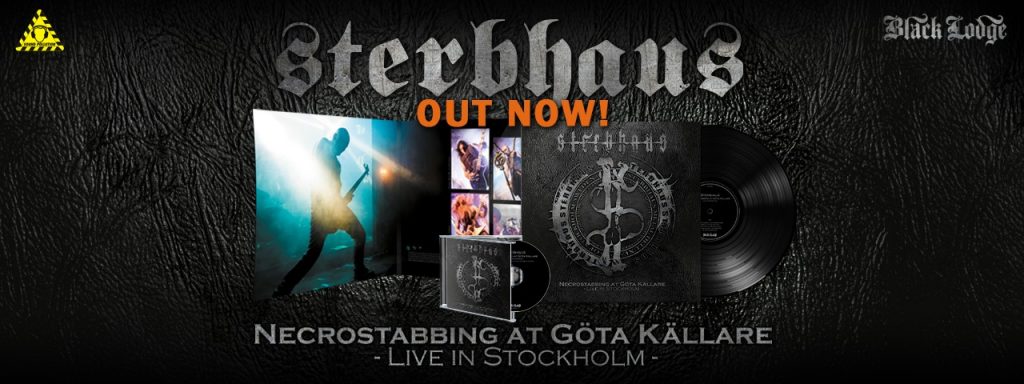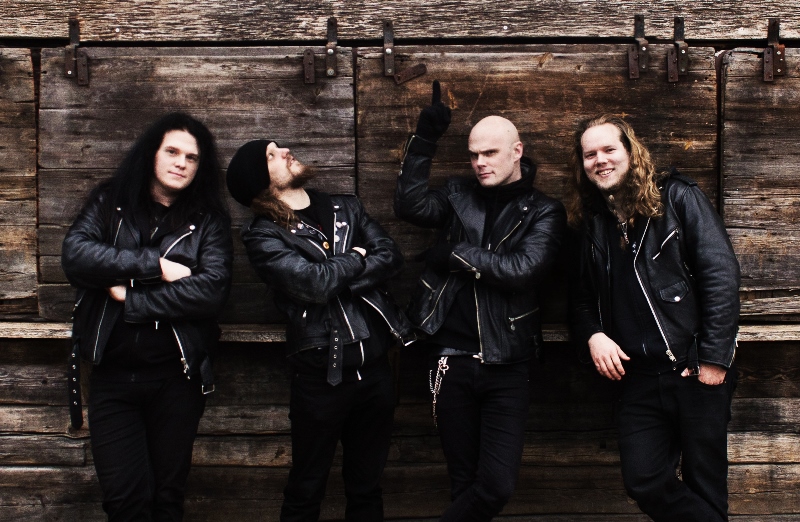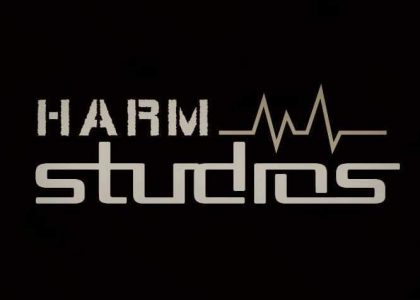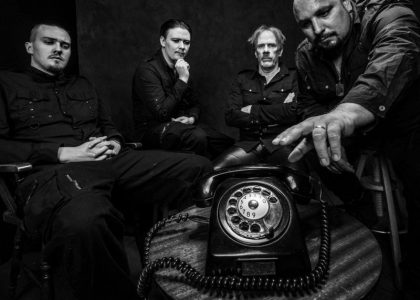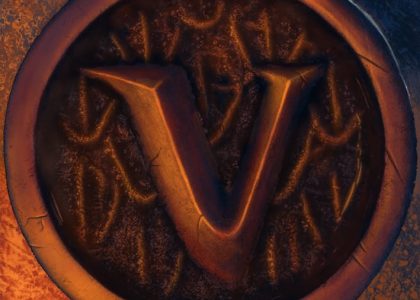In 2007, the band Sterbhaus was founded in Stockholm, Sweden. Originally started as a five piece band, the focus for the Swedes was mainly on Thrash Metal and related styles. Because all of the band members were also part of other bands and projects, Sterbhaus had a somewhat comical feel to it. Because the band members just wanted to make music together, the aspirations were not that high. That’s why humour also found its way into the lyrics, the music and the band’s appearance. Through the years, a lot has changed. Besides the necessary changes in the band, the musical style has become more serious and Sterbhaus has built a name for themselves, especially in their home country Sweden. Due to a number of reasons, including the Covid pandemic, co-founder and singer/guitarist Marcus Hammerström was thinking of disbanding the band. Nothing has turned out to be less true, however, because Sterbhaus recently released a live album. About this album, Covid and many other things, I spoke extensively with Marcus Hammerström.

Hey Marcus. Nice of you to make some time for Maizter-Underground.How are you doing? With the whole pandemic going on for more than a year now, your life might look different these days.
I am doing well. I have little to no complaints. On a personal level, I am doing well. It doesn’t interfere with my daily work and I live quite quietly so I don’t have that much contact with people around me. I have a lot of time to make and produce music, so that’s a nice bonus. Fortunately, I am not financially dependent on the music. Besides my work in Sterbhaus, I’m also a member of the Swedish supergroup called Shining. The impact is a bit bigger on that. We had a tour planned and some separate gigs. They’ve all been postponed and in one case cancelled. That’s sad for us and our fans, but health comes first. For Sterbhaus, it’s all a bit different as we didn’t have much planned when the pandemic broke out, so it didn’t have a negative impact.
Little planned with Sterbhaus also means little needed to be cancelled or rescheduled. Is there a reason why Sterbhaus slowed down?
To be honest, all the band members are busy with other projects and bands. We had already more or less decided to take it a lot slower with Sterbhaus. When the pandemic came along, I took a good look at everything. I went through all the music we had made over the years. Some of the songs, from the early days for example, don’t resemble Sterbhaus of today in any way, but they did feel right. Later music sounds great in another way. We also had a live recording of a release show of our most recent album. I’ve always wanted to do something with that and now an opportunity arose spontaneously. So the forced pause that came with the pandemic might have been a good thing for Sterbhaus.
Sterbhaus was founded in 2007. How does something like that come about and how do you come up with a German name?
Coming up with band names in general is hard enough, let alone a catchy one. At the time we started Sterbhaus, I had just bought a new flat. A beautiful place where unfortunately the previous occupant died. In Swedish we call that a “Sterbe-Hus” and that’s again a word borrowed from the German language, namely Sterbhaus. When I thought about it, it sounded to me like a good catchy name for a Thrash Metal band and so it happened. It’s a name without any further associations and seemed to us above all suitable as a band name. Sterbhaus originated in Stockholm, Sweden. In the early 90’s there was a whole scene around black metal in Sweden and at that time I had a solo project that existed for more than a decade. I released four albums, and when you do everything solo, you’re mostly very busy in your own studio recording all the different instruments and stuff. After more than 10 years, I had enough of that. And at the same time I didn’t have a very well-paid job. Everything was just going great. Somehow, I didn’t feel great about that. It felt like I was holding myself back in my development or something like that. Spoiled is perhaps a better word. One day, the switch was made. I quit my job without having a plan for the future. After a few months of coming to terms with myself, I started working in the construction industry. Something completely different from what I had done before, but the challenge appealed to me enormously. Literally the first day I started working there, I met two metalheads. I became good friends with one of them, named Daniel. Because I am a few years older than him, we moved around in different friend groups. Through Daniel, I met his group of friends they were all in bands again. However, these guys were not serious about music. Talent and quality they all had without a doubt, but it was all very casual and without great aspirations. During that summer (2007), Daniël came to me with the idea that he wanted to start a new band with some friends. The idea was to make music in the style of the Swedish At The Gates. The band would consist of 5 members and Daniël asked me to play the bass guitar. After more than 10 years with my solo project, this fitted perfectly in my plans and thus Sterbhaus was born. Over 14 years later, I am the only remaining founder of the band and a lot has changed.
We started with 5 people. In the beginning, it was very noncommittal and with no intention of becoming a successful band. Neither the music nor the lyrics were very serious and above all funny. Not meant to be negative, because it was a fantastic time for us. For me personally, it was great to be part of a band again. We made heavy music and spending time with new friends was a great bonus and from the start we had a good and healthy chemistry in the band.
Of course, a lot has happened in 14 years. Band members have left and been replaced, the music style has become a lot more serious and heavy over the years, and of course you’ve gone from just being the bass guitarist to being the lead singer of Sterbhaus and the only remaining founder of the band. How did you experience this period?
When we started, Daniel already had some contacts in the music business. Among others at the Abbyss Studio’s of Peter Tägtgren (Hypocrisy, Pain, Lindemann a.o.). There we were able to record our first demos and such with the help of Tommy Tägtgren, Peter’s brother indeed. That immediately resulted in high quality recordings and music. When the first demo came out, we mainly played in youth clubs and the like. That was an instructive and fun period with lots of parties and, of course, drinks. But the demo and the gigs were very well received, so we got the idea to take it more seriously with our first real album. I’m a bit older than the other founders, so from that moment on I took the lead. The album ( Hits For Dead Kids ) was released and we sent it around to generate attention and gain exposure. The Swedish magazine Close Up, among others, reviewed our album and liked it so much that we were selected to perform at a big Swedish festival called Metal Town. Big names like Slipknot and Marilyn Manson were performing there and we were suddenly among them. That was the first time Sterbhaus had performed in front of such a large audience.
But it was only after a few changes in the line-up of the band that we really got serious. Especially the entrance of Jimmy Ahovalli made us more serious and driven to make it a success. We immediately had a click and found each other on several fronts. Previously, Sterbhaus was more of an informal project with childish (for lack of a better word) lyrics and a humorous approach. We felt good about that in the beginning, but it also shows that the rest of the band was younger than me. When I started working with Jimmy, it immediately became more serious, without wanting to burn down the previous ones. We were just ready for a new step as a band. I started writing more lyrics and although Daniel liked the lyrics, more and more of Daniel’s lyrics disappeared from the music. Also, the musical direction of the band changed to harder and serious music. Once we got to recording the first demos for the new album, we came to the conclusion that the singing voice and the direction of the band didn’t match anymore. Daniel took a step back and, after some detours, I took the lead vocals. That was quite a change. Before, of course, I only played the bass and now the vocals were added. Fortunately, we all have some experience when it comes to live performances, so everything came together well in the end. All in all, we came out stronger as a band. The fact that I became the singer turned out to be a good move and the other band members who eventually make up the band also fit in perfectly. A very eventful period, but it has brought us a lot.

Let’s jump to the present. Friday, July 9, 2021 Sterbhaus has released a live album. On behalf of everyone at Maizter-Underground, I would like to extend my warmest congratulations. Releasing an album in the middle of a global pandemic is quite a task, let alone a live album. Can you tell us more about that?
There are a number of reasons behind this. First of all, this live album is a recording of our 2015 album release party of the album New Level Of Malevolence. This is our most recent album and was officially released on 17 October 2015. We recorded this entire show and always toyed with the idea of doing something with this. Once Covid-19 took hold of the world, I started thinking about what to do with Sterbhaus. Over the last few years we’ve been moving more into the background and we seriously considered disbanding the band. The costs of an album and a possible tour are simply too high. Promoting new material is quite a task these days and the whole music world has changed
with the arrival of streaming services and the like. Besides that, all the band members are also actively involved in other projects and bands and of course we all have social lives. Having said that, we always wanted to release a live album and the “break” brought on by the pandemic gave me the opportunity to delve into our archive of material. When I watched the live show in its entirety, I came to the conclusion that it would be a shame not to release it.
Fortunately, we still have a record deal (with Black Lodge, Sweden) and when I suggested the idea, they were enthusiastic as well. In the run-up to the release, we shared clips and tracks from the live show via social media and services such as YouTube. Eventually we decided to name the live album Necrostabbing At Göta Källare – Live In Stockholm and it was released in three versions. A CD version, a Vinyl version and a Special Edition Vinyl.
Can you tell us a bit more about the music and the setting of this album?
Well, it is a live registration of a (at the time) new album. New Level Of Malevolence is the last full length studio album we have made so far as Sterbhaus. As every artist says, this is our best work so far. We have tried to keep the music accessible but also bring out the complexity of Sterbhaus. Of course, it also helps that the quality of the recording is excellent, so it’s relatively easy to work with. And the reason we decided to release it in the middle of the pandemic is actually quite simple. Everyone is dying for live music and people have seen all the live shows and performances on the internet by now. We thought this would be a good time to release “new” material in the form of live music. We hope that people can appreciate it.
Do you have any future plans regarding Sterbhaus? Are there any live gigs in the near future?
Never say never, but for the time being nothing is planned. Of course, the pandemic plays a major role in this, but our personal preferences also play a role. Over the years, Sterbhaus has performed regularly for large and small audiences. We have played big festivals as well as smaller venues. We’ve all come to a point in our lives where we don’t want to make and release new material at any cost. The promotion and touring that goes with it are things that cost time and money. If we have both in abundance, it will be a different story. But for now, nothing is planned. We all have other things to do besides Sterbhaus and we want to do justice to the band. We won’t stop the band, and maybe after the pandemic there will be more room in our schedules or we can combine things. We definitely don’t want to throw
away our name and do justice to the fans. But if Nuclear Blast knocks on our door tomorrow with a million dollar contract, we won’t say no of course! Haha
OK! Thanks for your time! On behalf of everyone at Maizter-Underground I’d like to congratulate you once again on the release of the live album and wish you all the best with all the initiatives you’ll be taking in the future.
The live album Necrostabbing At Göta Källare – Live In Stockholm was released by the Swedish record label Black Lodge on Friday 9 July ’21 and is available in three versions. It can be ordered on the record label’s website, through Sterbhaus’ social media channels, and listened to through various streaming services. The album has been very well received in Sweden, where it is number one in the list of physical sales. When the digital sales are included, the live album has come in at number 9 in the list for total sales of Heavy Metal in Sweden.
Sterbhaus is:
Marcus Hammerström – Bass Guitar, Lead Vocalist
Jimmy Ahovalli – All Guitars
Erik Röjås – Drums
Simon Olovsson – Live Guitar (until 2016)
